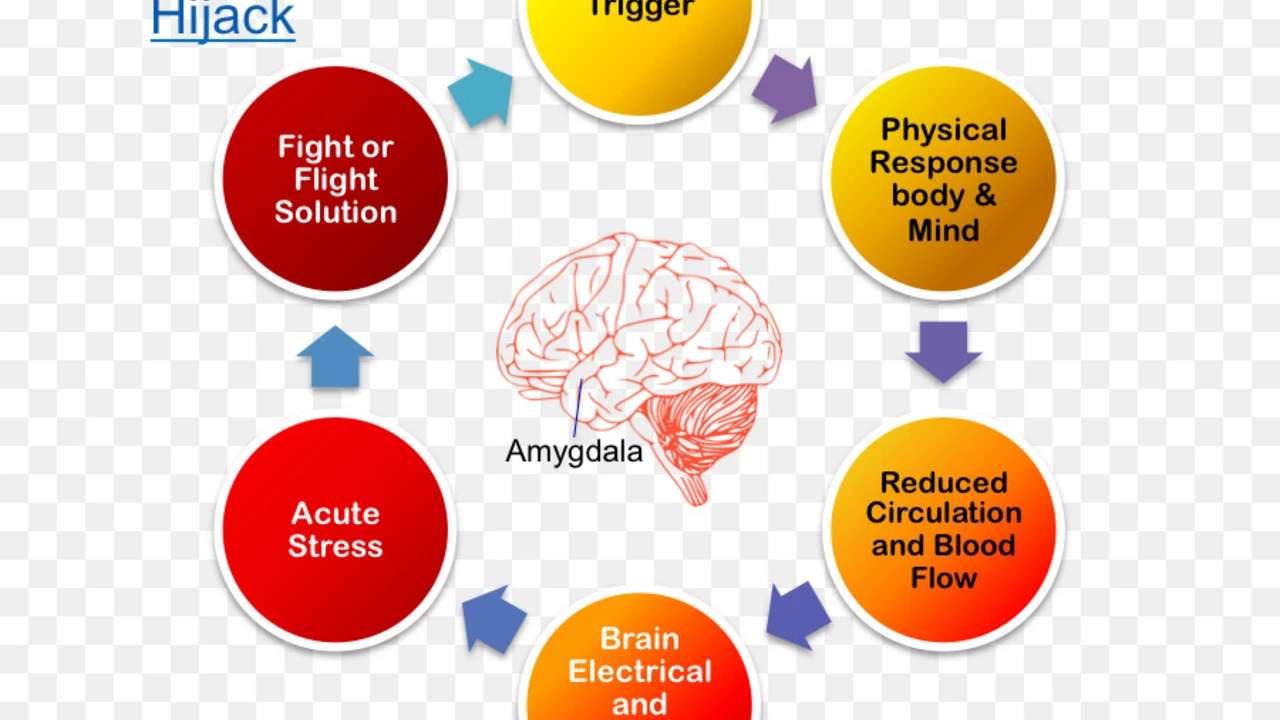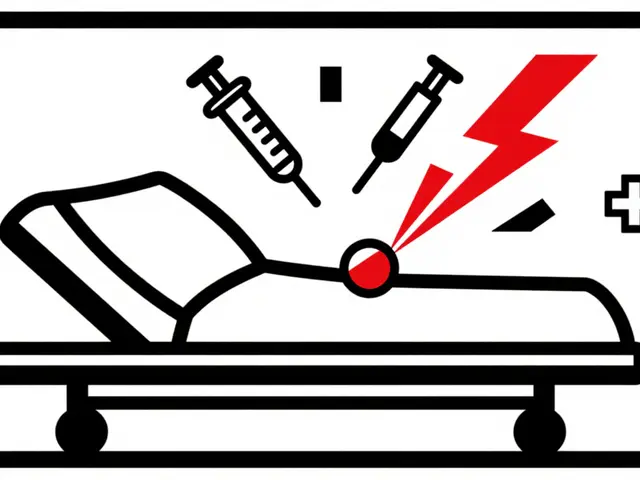Understanding Atomoxetine and Its Role
As a blogger and a student myself, I understand the challenges that come with studying and the pressure to perform acadically. This is why I am fascinated by Atomoxetine, a medication that is commonly used for Attention Deficit Hyperactivity Disorder (ADHD). This medication is designed to increase the ability to pay attention and decrease impulsiveness and hyperactivity in people with ADHD. I am curious to explore how Atomoxetine affects study skills and academic performance.
How Atomoxetine Works on the Brain
Before diving into the impact of Atomoxetine on study skills and academic performance, it's essential to understand how this medication works on the brain. Atomoxetine works by increasing the levels of norepinephrine, a natural substance in the brain that is needed to control behavior. The increase in norepinephrine improves attention span and reduces impulsive behavior and hyperactivity.
The Impact of Atomoxetine on Study Skills
Now, let's talk about how Atomoxetine can affect study skills. Improved attention span and reduced impulsivity can be significant boosts to study skills. This medication can help students stay focused on their studies for longer periods of time, aiding in better understanding and retention of information.
Atomoxetine and Academic Performance
Improved study skills can naturally lead to enhanced academic performance. With Atomoxetine, students may find themselves better able to concentrate during lectures, complete assignments more efficiently, and perform better on exams. The overall result can be a significant improvement in grades and academic standing.
The Long-Term Benefits of Atomoxetine
Beyond the immediate impact on study skills and academic performance, Atomoxetine can also have long-term benefits. By helping to instill good study habits and foster a more focused approach to learning, Atomoxetine can set students up for ongoing academic success. This can be particularly beneficial for those pursuing higher education or competitive fields.
Potential Side Effects of Atomoxetine
However, like any medication, Atomoxetine is not without potential side effects. Some people may experience nausea, stomach upset, fatigue, or loss of appetite. These side effects can, in some cases, impact study skills and academic performance negatively. It's important to weigh these potential drawbacks against the benefits.
Consulting Your Doctor About Atomoxetine
If you're considering Atomoxetine to enhance your study skills and academic performance, it's crucial to consult with a healthcare professional. They can provide personalized advice based on your medical history and current health status. They can also monitor your progress and adjust your dosage as needed to ensure the best results with minimal side effects.
Conclusion: Atomoxetine as a Tool for Academic Success
In conclusion, Atomoxetine can be a powerful tool for improving study skills and academic performance. However, it's not a magic pill, and its effectiveness can vary from person to person. Understanding how Atomoxetine works and weighing its potential benefits against its possible side effects is key to making an informed decision. As always, any decision about medication should be made in consultation with a healthcare professional.
FAQs: Atomoxetine and Academic Performance
In this final section, I will answer some frequently asked questions about Atomoxetine and its impact on study skills and academic performance. This will provide a quick reference for those looking for specific information or clarification on certain points.







Nancy N.
July 6, 2023 AT 22:56i just started taking this and honestly my notes look like a toddler drew them but i can sit through a 3 hour lecture without zoning out. progress?
Phillip Lee
July 7, 2023 AT 14:48This isn't a cognitive enhancer it's a chemical leash for neurodivergent people who refuse to adapt to a system designed for neurotypicals. Stop romanticizing pharmaceutical compliance.
Katie Wilson
July 8, 2023 AT 08:42I took this for 8 months and my GPA went from 2.1 to 3.8. Then I had a panic attack during finals and spent 3 weeks in therapy. It's not magic. It's a tool. And tools can cut you if you're not careful.
Shivani Tipnis
July 9, 2023 AT 07:40If you're not grinding 16 hours a day with no social life then you're not trying hard enough. Atomoxetine is just the spark. The fire is you. Stop looking for shortcuts and start building discipline.
Cindy Fitrasari S.
July 9, 2023 AT 11:17I get why people like this post. I used to be one of them. But I've seen too many friends lose themselves in the pursuit of perfect grades. What's the point of acing a class if you forget how to laugh?
Priyamvada Toshniwal
July 10, 2023 AT 15:59I'm from India and we don't talk about ADHD here like this. My cousin took atomoxetine and it changed his life. He went from failing all his exams to getting a scholarship. But he also had to go to therapy. Medication alone doesn't fix everything.
Denise Wood
July 12, 2023 AT 01:48Norepinephrine reuptake inhibition increases prefrontal cortex activation which enhances executive function. That's the science. But let's be real - if you're using this to pull all-nighters for a 4.0, you're not studying smarter, you're just burning out faster.
Andrew Butler
July 13, 2023 AT 06:10Big pharma wants you to believe this is a fix. It's not. It's a bandaid on a bullet wound. They make billions while you become dependent on a chemical that makes you feel like a robot who forgot how to breathe.
Varun Gupta
July 14, 2023 AT 03:04They put this in the water. You think it's for ADHD? Nah. It's to make students docile. No rebellion. No questions. Just quiet little drones grinding for the system. I don't take it. I drink coffee and scream into the void instead.
Amy Reynal
July 15, 2023 AT 22:26I'm a first-gen immigrant from rural Ohio and I took this in college. It helped me write my thesis. But I also had to unlearn 12 years of internalized shame about needing help. The pill didn't make me smart. It just let me stop hating myself long enough to try.
Erick Horn
July 16, 2023 AT 12:34You're all acting like this is the secret to success. Newsflash: discipline beats drugs. And if you need a pill to read a textbook, maybe you shouldn't be in college.
Lidia Hertel
July 17, 2023 AT 17:32I'm a grad student in the UK and I've been on this for 3 years. It helped me finish my research. But I also started journaling, meditating, and saying no to extra work. The pill helped me show up. But the healing? That was all me.
Chris Bock
July 18, 2023 AT 01:38The universe doesn't reward hustle. It rewards alignment. Atomoxetine just helps you fake alignment until you find your true path.
Alyson Knisel
July 18, 2023 AT 07:50I used to think I was lazy. Turns out I had ADHD. This med didn't make me productive. It just stopped me from hating myself every time I couldn't focus. That's worth more than any grade.
Jelisa Cameron- Humphrey
July 19, 2023 AT 13:47The neurochemical modulation of norepinephrine pathways enhances top-down cognitive control, reducing cognitive interference and facilitating sustained attentional allocation during complex academic tasks. That's the mechanism. But let's not forget: neurodiversity isn't a deficit to be corrected.
Lee Lach
July 21, 2023 AT 13:12You're all missing the point. This isn't about studying. It's about social control. The education system is designed to produce compliant workers. Atomoxetine is just the latest tool in the arsenal. Wake up.
Phillip Lee
July 22, 2023 AT 15:35You think you're being rebellious by not taking it? You're just letting the system win by default. The real rebellion is demanding a world that doesn't need pills to make people fit in.